How to bathe in an onsen
Increase the health-related effects of onsen by being conscious of how you bathe. By familiarizing yourself with proper bathing procedures, you too can become an onsen expert.
How to bathe in an onsen
(1)Rinsing off
Careful attention is required when pouring water over your body in order to acclimate it to high temperatures. In order to protect against sudden rises in blood pressure immediately after entering the onsen, be sure to pour water (about ten times) on your body starting from your extremities and moving toward your chest – from your ankles to your knees, and your wrists to your shoulders. Simply pouring water over yourself will not have any effect. It is also an important aspect of bathing etiquette to make sure you thoroughly rinse off your body before entering the baths.
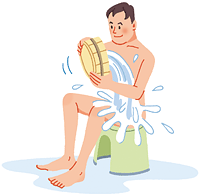
(2)When soaking in hot water, first submerge only half of your body
It is good practice to start off by allowing your body to acclimate to the water by submerging only halfway rather than immediately soaking your entire body. By following this procedure, you can avoid excessive physical burdens resultant from high temperature and water pressure.
It is especially effective to wash your body after warming up in a bath. Old dead skin cells become softened and your pores open, which allows dirt to rise to the surface of your skin, making it easy to rinse off.
* Be sure to slowly enter high-temperature baths
* People wearing makeup should cleanse their faces during the rinsing stage. This is because makeup becomes an obstruction preventing pores from opening even after your body temperature rises.
* It is a good rule of thumb to bathe until you feel sweat on your forehead and the tip of your nose. You should not bathe so long that you begin to sweat heavily and experience palpitations. Bathing for too long can conversely lead to feeling chilly after leaving the water.
It is especially effective to wash your body after warming up in a bath. Old dead skin cells become softened and your pores open, which allows dirt to rise to the surface of your skin, making it easy to rinse off.
* Be sure to slowly enter high-temperature baths
* People wearing makeup should cleanse their faces during the rinsing stage. This is because makeup becomes an obstruction preventing pores from opening even after your body temperature rises.
* It is a good rule of thumb to bathe until you feel sweat on your forehead and the tip of your nose. You should not bathe so long that you begin to sweat heavily and experience palpitations. Bathing for too long can conversely lead to feeling chilly after leaving the water.
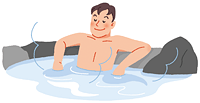
(3)Do not rinse off after bathing in onsen
It depends on the type of onsen, but rinsing yourself off after bathing in an onsen can also weaken the effects of nutrients and other elements in the water. When drying off, try to only wipe off the beads of water.
* People with sensitive skin should wash and rinse thoroughly. Also note that in the case of extremely stimulating acidic springs or people with weak skin, overexposure may be a concern.
* People with sensitive skin should wash and rinse thoroughly. Also note that in the case of extremely stimulating acidic springs or people with weak skin, overexposure may be a concern.
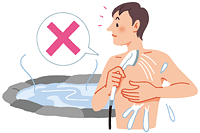
(4)Keep your body hydrated
When you sweat, your body loses internal moisture. Make sure to help your body retain moisture by drinking lukewarm water or sport drinks.
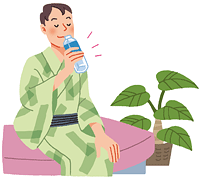
(5)Rest and relax
Your body consumes energy while bathing in hot water. There are also fluctuations that take place in your blood pressure, so it's a good idea to allow your body to rest for at least thirty minutes in order for your physical condition to stabilize. During this period, it is important to prevent yourself from chilling off by drying your body and your hair.
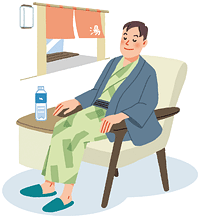
Bathing manners
- 1.Thoroughly rinse off sweat and dirt before entering the water.
- 2.Do not drop your towel into the water.
- 3.Refrain from swimming in the water.